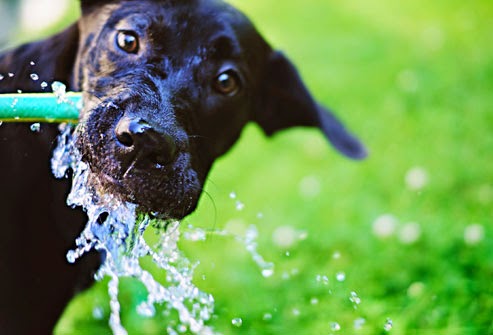Water intoxication is a life threatening condition,
leading to death in many cases. Some dogs do survive with intensive treatment
but many suffer brain damage and have neurological impairment
afterward. This
condition is much easier to prevent then to cure, since by the time symptoms are
noticed it may be too late for treatment.
Water intoxication describes a condition where more water
is taken in than the kidneys can process. The excess water dilutes or lowers
sodium levels, and is then taken up by the cells in the body to try to maintain
a normal sodium level. This leads to swelling of the cells throughout the body,
including brain cells. While there is room for swelling in most organs, the
brain is incased in the skull. Any swelling of brain cells damages those cells,
and can lead very quickly to death.
Water intoxication in dogs is most likely to happen while
swimming or playing in the water. Diving for toys or swimming to retrieve a toy
causes the dog to swallow water. If the play goes on long enough the dog will
swallow more water than the kidneys can process. This doesn't mean your dog can
never play in the water, just that the water play intervals are short enough
and dry land breaks are long enough that the kidneys can keep up with the water
being swallowed. Choosing a flat toy for your dog to retrieve rather than a
ball helps keeps the mouth closed while swimming, limiting the water that is
swallowed. Keep an eye on your dog
during play, and make sure they are urinating during breaks.
 Your dog is also at risk if he or she likes to bite water
coming out of a hose or sprinkler, or biting at waves on the beach. When dogs
do this they are swallowing some of the water, and you need to make sure they
aren't swallowing too much. Again, make sure the "dry" breaks are
long enough for the kidneys to keep up with the water.
Your dog is also at risk if he or she likes to bite water
coming out of a hose or sprinkler, or biting at waves on the beach. When dogs
do this they are swallowing some of the water, and you need to make sure they
aren't swallowing too much. Again, make sure the "dry" breaks are
long enough for the kidneys to keep up with the water.
Another risk for the wave biters is sand bloat. If the
waves are stirring up sand on the beach, your dog is also swallowing sand. This
can lead to a condition called sand bloat, another life threatening condition.
The sand actually causes a blockage in the stomach or intestine, requiring
surgery. It is never a good idea to let your dog bite at waves, or to throw a
toy where they are retrieving in the surf line.
Dogs that were
bred for water retrieving like labs and goldens tend to swim with their heads
held high out of the water. This helps to limit the water they swallow while
swimming. If your dog loves to swim, observe how they hold their head. Is it
high or at water level? Is your dog so obsessed with swimming they don't stop
unless you make them? These dogs are at higher risk and need more and longer
breaks. Toy breeds and any dog with a very low body fat level are also at
higher risk for water intoxication. The little ones have less body mass and the
lean dogs don't have fat cells to store the excess water in.
Water play is great exercise for your dog, especially in
the summer when it's too hot for other forms of play. Just be careful and make
sure the dry land breaks are long enough.
We carry Whole Dog Journal in our store! Stop by and pick one up to read up on healthy care for your pet!


Water intoxication in dogs is not quite a very common incident which makes it one of the least understood illnesses that a pet could have. It is caused by water and perhaps this is why it is commonly ignored since water is quite a harmless substance. Who could think that drinking it in certain amounts can cause immediate death? See more here http://dogsaholic.com/care/water-intoxication-in-dogs.html
ReplyDeleteThanks for sharing the best information and suggestions, it is very nice and very useful to us. I appreciate the work that you have shared in this post. Keep sharing these types of articles here.
ReplyDeleteDog Grooming Kit